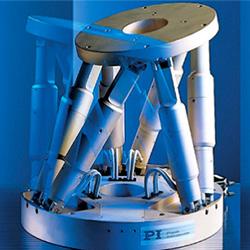Chemical Insights Research Institute and the Campus Safety, Health, and Environmental Management Association Publish Guidance for the Safe Use of 3D Printing in Institutions of Higher Education
New resource provides best practices for the safe use of 3D printing and healthier indoor air quality
Chemical Insights Research Institute (CIRI) of UL Research Institutes and the Campus Safety, Health, and Environmental Management Association (CSHEMA), announce the publication of, "UL 200B: Guidance Document for Safe Use of 3D Printing for Institutions of Higher Education."
"The publication of UL 200B empowers professionals by providing and encouraging best practices for safe use and managing safety and health considerations to maximize the benefits and innovative potential of 3D printing on campuses. UL 200B offers important risk management tools for campus EHS professionals"
Tweet this
The availability of 3D printing has fostered creative and innovative learning experiences for many within the large population of students in higher education. There are roughly 17.3 million undergraduates in the U.S. alone. Because 3D printers are affordable, compact, and user friendly, they can be found across campuses today—in offices, libraries, laboratories, hallways, residence halls, and classrooms. In a survey of CSHEMA members, the most common locations for 3D printing activities were campus makerspaces and labs. However, 20-40% of respondents indicated that 3D printers were found in libraries, offices, and student housing. Based on these results, 3D printers might be located where best practices around health and safety concerns may not be well understood.
According to Dr. Marilyn Black, vice president and senior technical advisor of CIRI, "While 3D printing offers tremendous educational opportunities, it has unintentional consequences of releasing hazardous volatile organic compounds (VOCs) and ultrafine particles into the air while operating. Recent toxicology research has shown that exposure to these emissions may contribute to cellular injury, inflammation, and oxidative damage to biomolecules that serve critical roles in living cells."
CIRI teamed with CSHEMA to form a working group of health and safety experts from leading universities across the U.S. to develop guidance on the safe use of 3D printers. These experts brought together CIRI's research knowledge with professionals having decades of applied experience with campus facilities and populations, to address the critical need for this benchmark Guidance Document. Years of 3D printing emissions research from CIRI has found that applying best practices and certain mitigation strategies can decrease the effect these emissions have on indoor air quality and protect users and observers from adverse acute and chronic health impacts of exposure.
"The publication of UL 200B empowers professionals by providing and encouraging best practices for safe use and managing safety and health considerations to maximize the benefits and innovative potential of 3D printing on campuses. UL 200B offers important risk management tools for campus EHS professionals," said Beth Welmaker, president of CSHEMA and executive director of environmental health and safety at Nova Southeastern University.
To access the official document visit: shopulstandards.com.
Learn more at chemicalinsights.org.
Interact with almost a decade of 3D printing research data collected by CIRI by using the Data Portal.
Read the Handout, 3D Printers and Air Quality: Health Effects and Mitigation Strategies for Use of 3D Printers in Higher Education.
Read the Health Risk Report, Dosimetric and Toxicological Analysis of 3D Printer Emitted Particles.
About Chemical Insights Research Institute
Chemical Insights Research Institute (CIRI) of UL Research Institutes is a nonprofit organization dedicated to scientific research, publication, education, and communication on environmental exposures resulting from technologies and practices, their impact on human health, and processes for reducing health risks. CIRI provides actionable data and resources to help manufacturers, educators, healthcare providers, and consumers make informed environmental health decisions and risk reduction strategies for the protection of human health.
About Campus, Safety, Health, and Environmental Management Association (CSHEMA)
The mission of CSHEMA is to support and to educate campus-based Environmental Health and Safety professionals to empower and to improve the EHS profession in campus environments. CSHEMA's core values are to uphold the honor, integrity, and dignity of the profession, promote inclusion and diversity in the profession, provide strong member services through ongoing needs assessment for campus-based EHS professionals, to provide advocacy on behalf of the profession as the voice of campus-based EHS, and to demonstrate commitment to practical and applicable solutions for the campus-based EHS professional, to continuous improvement and to education.
About UL Research Institutes
UL Research Institutes is a nonprofit research organization dedicated to advancing public safety through scientific discovery. Since 1894, our research has advanced our mission toward a safer, more secure, and sustainable future. Focused on global risks from fire mitigation and air quality to safe energy storage and digital privacy, we conduct rigorous independent research, analyze safety data and partner with experts to uncover and act on existing and emerging risks to human safety.
Discover more at UL.org.
Featured Product

PI USA - Hexapod for Industrial Alignment
This new compact 6-axis hexapod was designed with 24/7 industrial precision alignment tasks and easy serviceability in mind. It is equipped with absolute encoders (no need for referencing) and motor brakes that automatically engage during a loss of power, for extra safety. Debuting at Photonics West 2025 last month, applications include camera lens alignment, micro assembly, and fiber optical alignment applications.
